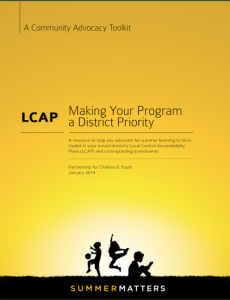Making Your Program a District Priority
A Community Advocacy Toolkit for Making Your Program a District Priority
This packet is a resource to help you advocate for summer learning to be included in your school district’s Local Control Accountability Plans (LCAP) and corresponding investments. This guide includes:
- A short explanation of the Local Control Funding Formula (LCFF)
- The articulated “ask” you are advocating for.
- Six advocacy activities with a corresponding timeline.
- An appendix of resources to support your advocacy efforts.
Leveraging LCFF to Fund Year-Round Learning
The Local Control Funding Formula (LCFF), a new education funding mechanism created by the state of California, gives school districts new flexibility in the allocation of funds to reach California educational goals.
California has eight (8) state priorities:
- Common Core State Standards (CCSS) implementation,
- Student achievement,
- Student engagement,
- School climate,
- Parental involvement,
- Course access,
- Other student outcomes,
- and basic educational services
The use of LCFF funds is defined in a Local Control and Accountability Plan (LCAP) submitted by each school district. The plan explains how the school district will use LCFF funding to meet the district’s and the state’s goals. Plans last for 3 years.
LCFF is an ideal source of funding for Summer Learning programs. The programs support California priorities, and especially benefit those most at risk: low-income, ELL and foster children.
Ask Your School District to Support Summer Learning
The Summer Matters vision is that all young people in California have access to high quality summer learning opportunities that support their year-round learning and well-being.
Evidence shows that high-quality summer learning programs that provide intentional, engaging, and relevant activities can prevent summer learning loss and support healthy behaviors during summertime.
We want districts and communities to invest in summer learning programs to ensure:
- Students have the opportunity to learn year-round.
- School year investments aren’t lost, and students don’t lose ground.
- Schools meet their student learning goals by using their limited resources effectively.
Advocating in Your School District
Bring Summer Learning programs to school districts requires advocating for their inclusion in LCAPs. Below we list several advocacy techniques and principles you can utilize to build support for summer learning:
1. Know Your Core Principles and Key Message
Knowing your organizational core principles will help you define what is sacred and what can be compromised. Be able to articulate the principles that inform your program’s mission, goals, and design.
2. Know Your Audiences
Stakeholders who will directly inform the goals and strategies in a district’s LCAP include: superintendents, school board members, school staff and family advisory groups (e.g. School Site Council, English Learners Advisory Committee, etc.). These are some of your key audiences – the people who have to believe that summer learning is a good investment.
3. Gather Information
The efficacy of your messaging and advocacy will be as strong as the information you have. Your knowledge is also evidence of your investment in the community. Additionally you need to gather data to support the validity of your messages.
4. Share Your Information
Once you’ve gathered the information, it’s time to determine how best to communicate, organize, and share it. Please keep in mind, that while you want to be seen as a valued resource on summer learning, it is okay to admit if and when you don’t know something. You will demonstrate integrity by being honest, and you can always agree to do more research and provide it in a timely manner.
5. Build and Leverage Relationships
Continually look for opportunities to solidify relationships and establish new ones. Regular and thoughtful communication helps develop relationships and build greater awareness about your program and issue. Remember that your target audiences are: superintendents, school board members, school staff, and families.
6. Sustain Advocacy Efforts
Running a youth program requires a lot of time and energy and there is always more to do. So to safeguard that your program continues to run, you need to make sure that your advocacy work (which might dictate the sustainability of your program) does not fall to the wayside. In order to do that, create a work plan with prioritized tasks, people responsible for each task, a corresponding timeline, and reference materials.
Use This Toolkit to Bring Summer Learning to Your District
The toolkit includes more information about advocacy techniques, an outline of LCAP development processes, sample documents you can use to develop your organization, and a reading list.
Download Making Your Program a District Priority today and start building organization and support needed to bring summer learning programs to your district.




